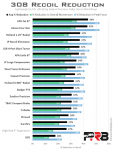May be a stupid question, but this is meant to be the place to ask, so here goes...
I recently worked up my first load for my precision rifle, and did so without a suppressor. Every now and again I do like to shoot suppressed, so my question is, will shooting suppressed affect my load? Or should it still maintain the same characteristics, BC, etc... In case it helps, its a Silencerco Saker 7.62 and the load is 175 SMK using 43.7g of Varget. Caliber is .308
Cheers,
Jamie
I recently worked up my first load for my precision rifle, and did so without a suppressor. Every now and again I do like to shoot suppressed, so my question is, will shooting suppressed affect my load? Or should it still maintain the same characteristics, BC, etc... In case it helps, its a Silencerco Saker 7.62 and the load is 175 SMK using 43.7g of Varget. Caliber is .308
Cheers,
Jamie




